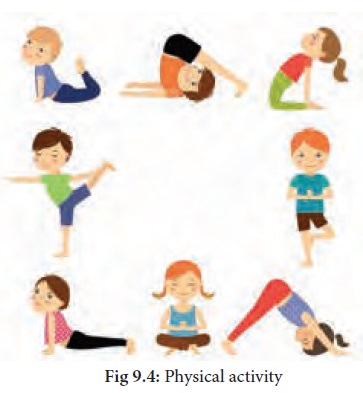Types, Benefits | Energy - Physical activity | 11th Nutrition and Dietetics : Chapter 9 : Carbohydrates and Energy
Chapter: 11th Nutrition and Dietetics : Chapter 9 : Carbohydrates and Energy
Physical activity
Physical
activity
Exercise is defined as
any movement that makes the muscles work and requires the body to burn
calories. There are many types of physical activity, including swimming, running,
jogging, walking and dancing, to name a few.Being active has been shown to have
many health benefits, both physically and mentally.

Types of Physical Activity
The four main types of
physical activity are aerobic, muscle-strengthening, bone- strengthening, and
stretching. Aerobic activity is the type that benefits your heart and lungs the
most.
a. Aerobic Activity
Aerobic activity moves
the large muscles, such as those in the arms and legs. Running, swimming,
walking, bicycling, dancing, and doing jumping jacks are examples of aerobic
activity. Aerobic activity is also called endurance activity. Aerobic activity
makes the heart beat
faster than usual and
makes the person to breathe harder during this type of activity. Over time, regular
aerobic activity makes the heart and lungs stronger and able to work better.
b. Other Types of Physical Activity
The other types of
physical activity like muscle-strengthening, bone strengthening and stretching
benefit the body in other ways.
Muscle-strengthening
activities improve the strength, power, and endurance of the muscles. Doing
pushups and sit-ups, lifting weights, climbing stairs, and working in the
garden are examples of muscle-strengthening activities.
With
bone-strengthening activities feet, legs, or arms support the body weight, and
the muscles push against the bones. This helps make the bone stronger. Running,
walking, jumping rope and lifting weights are examples of bone-strengthening
activities.
Muscle-strengthening
and bonestreng- thening activities also can be aerobic, depending on whether
they make the heart and lungs work harder than usual. For example, running is
both an aerobic activity and a bone-strengthening activity.
Stretching helps
improve flexibility and ability to fully move the joints. Touching toes, doing
side stretches, and doing yoga exercises are examples of stretching.
Benefits of physical activity
·
Assists in weight control mainly by burning calories and thereby
reducing body fat.
·
Raises self-esteem and physical awareness.
·
Reduces symptoms of ageing.
·
Allows body to use fats and sugars more efficiently.
·
Improves digestion and metabolism
·
Strengthens and improves
the functioning of the
heart and lungs.
·
Reduces risk of heart disease and vascular disease by increasing
the HDL cholesterol levels(Good cholesterol) in the blood.
·
Strengthens the muscles, ligaments, tendons, joints and bones.
·
Regulates blood pressure and helps in controlling hypertension.
·
Preventing osteoporosis by strengthening and slowing down the
loss of calcium in the bones.
·
Regulates hormone levels and helps to alleviate premenstrual and
menopausal symptoms.
·
Reduces stress and combats depression.
·
Promotes a positive outlook in life.
·
Improves immunity and increases resistance to infections.
·
Promotes a healthy lifestyle.
Related Topics